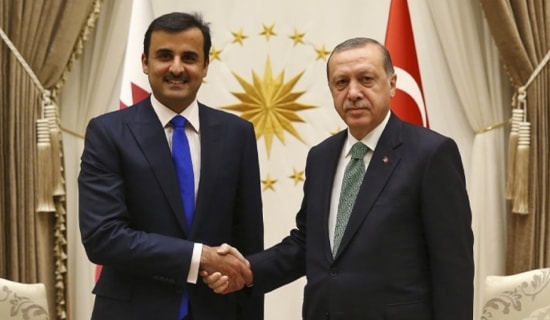In May 2015, despite airstrikes by the U.S.-led international coalition, the Islamic State (ISIS) won another strategic victory when it captured the city of Al-Ramadi, the capital of Al-Anbar governorate, which is home to a Sunni majority. Articles in Saudi Arabia and Qatar, which are both members of the anti-ISIS coalition, expressed fear and concern regarding the fall of Al-Ramadi and ISIS's advance towards the Saudi and Jordanian borders. The articles placed the blame for this failure primarily on the U.S., saying that its policy in recent years and the strategy it formulated to deal with Iraq were responsible for ISIS's emergence and its spread in this country. They traced the roots of the chaotic situation in Iraq to the "American occupation" of the country in 2003, and claimed that the U.S. had dismantled the Iraqi army without establishing a new national army to replace it. They also said that the U.S. had transferred the management of the country to Iraqi Shi'ite forces and to their sponsor, Iran, while marginalizing the Sunni population - thus sparking sectarian tensions and creating fertile ground for the rise of ISIS in that population.
This American policy, the writers noted, causes Saudi Arabia and the Gulf states to fear not just for the fate of Iraq and its Sunni population, but also for their own future and their ability to rely on the U.S. to defend them from the threat of ISIS and from Iran. This, especially in light of the American efforts to sign a nuclear agreement with Iran in the near future. The article accused the U.S. that, in its eagerness to reach an agreement with Iran, it enables this country to do as it pleases in the Middle East and recognizes its role there.
The following are excerpts from the Saudi and Qatari articles:

ISIS fighters in Ramadi(image: thenewkhalij.com, June 4, 2015)
'Al-Quds Al-Arabi': The Fall Of Al-Ramadi Has Proven That Continuing To Rely On The U.S. Is Suicidal
In a scathing editorial titled "Al-Ramadi and the Danger The American Collapse Poses for Saudi Arabia and Jordan", the London-based Qatari daily Al-Quds Al-Arabi claimed that the reason for ISIS's appearance in Iraq was the country's occupation by the U.S., the dismantling of its army, and the U.S,'s withdrawal without establishing an alternative national army. According to the daily, ISIS's capture of Al-Ramadi was further proof of the failure of the American strategy to deal with the organization, which raises questions regarding America's will or ability to defend Arab countries both from Iran and from the ISIS threat. The daily called on Arab countries to break free of illusions and of President Obama's promises at the Camp David summit in May 2015. It stated: "Yesterday [May 20, 2015], Iraqi Prime Minister Haidar Al-'Abadi arrived in Moscow to request urgent military aid... Al-'Abadi's visit may be further proof of how angry he is, and to what extent he has despaired of the American military and [America's] strategic failure in Iraq...
"An Arab observer may well wonder whether the U.S., which failed to defend a small yet important city like Al-Ramadi, is able or willing to be involved in larger campaigns to defend its allies in the Middle East from the Iranian danger, in accordance with Obama's shining promises at the recent Camp David summit.
"The failure of the 'Obama strategy' to beat back the Islamic State was shamefully exposed again in Al-Ramadi. Therefore, continuing to rely on it is suicidal, and spells the fall of Baghdad itself and later the division of Iraq into provinces or cantons controlled by militias - the Peshmerga, ISIS, Al-Hashd Al-Sha'abi [a union of armed Iraqi Shi'ite militias, mostly supported by Iran], and others. Thus, Iraq will fall into a reality... that will dwarf the massacres that took place in Yugoslavia in the 1990s...
"On the regional level, the fall of Al-Anbar opens a wide front for the Islamic State on the Saudi and Jordanian borders and constitutes a direct and unprecedented threat to those countries, especially in light of the claims that the organization has popular support in several tribal regions there. No objective assessment of the disastrous fall of Al-Ramadi can deny that Arabs are currently paying the price of a double American crime in Iraq: the criminal occupation by the Bush administration, and the Obama administration's chaotic withdrawal, which was more like flight, before it had established a true national army that could provide security for all Iraqis and would replace the army that had been dismantled after the invasion. If not for these American crimes, Iraq would have never seen the black banners, the terrorist organizations, or the sectarian militias that spelled the end, or the near end, of the last remnants of a country.
"The American collapse in the region, with Al-Ramadi as its most recent headline, spells a swift dissipation of the illusions on which Arabs have been relying for many decades in constructing the strategy of defending their regional security. This could make Iraq the first - but not the last - Arab country to be partitioned."[1]
Former 'Al-Sharq Al-Awsat' Editor: U.S. Has Given Iran Free Reign In Iraq
Tariq Al-Homayed, the former editor of the London-based Saudi daily Al-Sharq Al-Awsat, wrote that Al-Ramadi falling to ISIS stemmed from the Iraqi army's weakness, and from the reliance on Shi'ite militias supported by Iran to defend Iraq instead of arming Sunni tribes so they could defend themselves. The reason for this, he claimed, was the U.S.'s hesitance and its attempts to reach a nuclear agreement with Iran, while giving it free reign in Arab countries. He wrote: "What is happening in Al-Ramadi is [just] a small example of the massive absurdity that prevails in our region due to international lethargy and hesitancy in dealing with acute problems, including ending Iranian intervention in the region and working seriously to fill the political vacuum in Iraq, which is the result of the central government's weakness due to its sectarian [i.e., anti-Sunni] nature. As a result, there is a marginalization of Sunnis and reliance on Shi'ite militias backed by Iran instead of achieving national reconciliation, and ending sectarian marginalization [of the Sunnis] and the insistence on not arming Sunni tribes.
"This is an expression of international, and especially American, hesitancy, since the U.S. is busy negotiating with Iran, [while giving it] free reign in the region - from Iraq to Yemen and from Syria to Lebanon..."[2]
'Al-Hayat' Columnist: U.S. Recognizes Iranian Role In Iraq
Elias Harfoush, a columnist for the London-based Saudi daily Al-Hayat, claimed that Iraq faces a dual danger from ISIS and from Iran, which seeks to take it over with American backing. According to him, the roots of Iraq's current state is the destruction of its army by the Americans. He wrote: "The fall of Al-Ramadi to ISIS is an exact repetition of what happened one year ago in Mosul, when the Iraqi army fled [from the city] like a fawn with all the equipment it could carry, leaving what couldn't be carried to the ISIS terrorists who used it to continue their advance...
"At the same time, the Iranians hasten to assist the Iraqi government. Iranian Defense Minister Hossein Dehghan was one of the first people to arrive in Baghdad. Ali Khamenei's advisor, Ali Akbar Velayeti, stated in Beirut and Damascus - which are two of the capitals of the reemerging 'Iranian Empire', along with Sana'a and Baghdad - that Tehran was prepared to assist the Iraqi government if it asked 'officially as a sister country.' The practical meaning [of such a request] would be an open declaration by the Baghdad government that Iraq's fate was in Iran's hands if it wished to save its provinces from ISIS's advance.
"Some may ask: Where are the Americans in all these developments? And what of the Obama administration, which withdrew from Iraq after occupying it and handed its management to the Iranians? [U.S.] Secretary of State John Kerry said that the fall of Al-Ramadi to ISIS would not last long and that [the city] would be liberated in a few weeks. Other American officials did not object to Iran participating in the fight against ISIS by means of the Al-Hash Al-Sha'abi militias, so long as they were supervised by the Iraqi leadership. This is an insult to [our] intelligence, since it is known that Al-Hashd Al-Sha'abi receives its orders and even its weapons and equipment from Iran, and therefore this [position] constitutes [an American] recognition of the Iranian role and the need for [Iran's help] in liberating Iraq's largest governorate with a Sunni majority.
"The fall of Al-Ramadi is a great defeat for the national program in Iraq and the building of a unified army that would be responsible for all Iraqi regions regardless of their sectarian identity. But this defeat is unsurprising. The destruction of the Iraqi army was started by the U.S. with what [Iraq administrator] Paul Bremer called 'de-Baathification.' It continued with the rebuilding of the army on a sectarian basis and the marginalization of skilled [Sunnis], especially under the Nouri Al-Maliki government, which squandered billions of dollars on building an army that was exposed to be a fiction. The failure of the plan to rely on this army was proven again and again every time it was asked to fulfill its responsibility and protect Sunni areas against ISIS attacks..."[3]
Endnotes:




